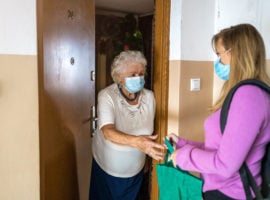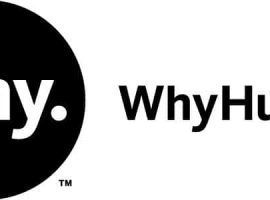When I caught up with Reverend Ann Kansfield on Wednesday afternoon, she was just about to begin preparations for that evening’s community dinner. Despite its location just a block away from the flooded evacuation zone, Greenpoint Reformed Church fared well during Hurricane Sandy. The small church, which operates one of the only soup kitchens and food pantries in Greenpoint, Brooklyn, serves 6,000 people each month and did not flood or lose power through the storm. I asked Pastor Ann how they were able to bounce back to serve the community so quickly after Hurricane Sandy had crippled much of the Eastern Seaboard, and she credited her volunteers: “We already have local boots on the ground because we do this 365 days a year. We have a great volunteer force and a good reputation in the neighborhood.”
Using Facebook and Twitter–both major means of communication especially after the hurricane–Ann coordinated volunteers for a special delivery from the Food Bank for NYC at 7:30am on Thursday morning. Because Hurricane Sandy prevented the Food Bank’s normal Tuesday delivery, volunteers had to quickly pack hundreds of bags of food to distribute to community members at noon.
The Greenpoint Reformed Church has also secured a grant from the United Church of Christ to hire someone to work scheduled hours helping community members apply for replacement SNAP (food stamp) benefits. Many people who receive SNAP benefits and lost perishable food due to flooding or power outage do not know that replacement SNAP benefits are available to them, nor do they know how to how to claim them. Pastor Ann says that because “getting to the HRA [Human Resources Administration] office can be difficult with the MTA [Metropolitan Transportation Authority] shutdown, and the line at the office is long, our plan is to provide the forms here, along with help completing and faxing them to the HRA office…This sort of outreach is possible for other churches and community organizations.”
Pastor Ann and I spoke about some of the challenges and needs of the soup kitchen and food pantry this week, such as uncertain food deliveries and securing childcare so she could work this week. She also mentioned that she now sees the importance of having things like a generator for the refrigerator or a chainsaw for clearing away fallen trees, but she also made it very clear that the best way to help emergency food providers and the clients they serve is not through canned food drives, but continuous financial support.
Emergency food providers play an indispensable role after natural disasters, which have a disproportionate effect on people with little or no savings. The New York Times reported that earlier this week, nearly 7% of the U.S. population was without electricity due to Hurricane Sandy. Many people who are already suffering from lost income will have difficulty affording the food to replace what spoiled in their refrigerators and freezers. Many of the food pantries and food banks that serve them were also hit hard by the storm and will need financial help to recover.
As an advocate on Why Hunger’s National Hunger Hotline, I am acutely aware of the impact that natural disasters have on hunger. This week, we’ve received calls from people in New York, New Jersey, Pennsylvania and Maryland who were affected by Hurricane Sandy. Back in August, I heard from people in Louisiana who were hit hard by Hurricane Isaac, and earlier in the summer, I responded to calls from people who had been displaced by the wildfires in Colorado. These Hotline calls, however, are greatly eclipsed by the number of calls we receive on a regular basis throughout the year from people all over the country who are struggling to feed their families. Hunger is at an all-time high in this country and around the world, and natural disasters exacerbate and highlight this. The crisis of hunger and poverty is still ongoing, so when Hurricane Sandy begins to fade from the news reports, it’s important that our support of the emergency food providers and grassroots organizations who are leading the movement to end hunger does not fade as well.
Click here to learn more about supporting our grassroots partners after Hurricane Sandy and here to learn more about supporting the Greenpoint Reformed Church Hunger Program.
For more information about applying for emergency SNAP benefits, call your state’s SNAP Hotline.
UPDATE 11/6/2012:
The USDA Food and Nutrition Service has approved the mass replacement of SNAP benefits to households in many of the counties and zip codes affected by Hurricane Sandy. Current SNAP recipients in these areas will automatically receive a portion of their monthly allotment on their EBT (Electronic Balance Transfer) cards and do not need to request a replacement or submit paperwork, unless they are requesting a full replacement of benefits. Those who do not currently receive SNAP benefits but are entitled to Disaster-SNAP benefits will still need to apply. For more information on which counties will automatically receive benefits, click here. For a list of NYC zip codes that will automatically receive benefits, click here.






